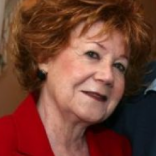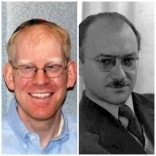Spectres
Brandon Davis Jennings
Rake and I sat in the shade cast by a rusted-out deuce-and-a-half that was buried to its wheel wells in hard-packed sand; that truck was a relic from a war we had nothing to do with, but we were glad it was there to lean on. Rake ejected his clip into his palm and slapped it back into the magazine-well over and over while we waited for the Spectre. We’d called in an airstrike on a village a couple hundred yards from where we sat because weapons were in the houses, or there were terrorists; it didn’t really matter. We were short, and my wife and daughter were my first priorities—which is another way of saying staying alive was my first priority. So we’d said, “Yes, sir,” to our orders and rushed over the sand and fields dotted by scorched poppies, and we wasted no time sweeping the houses—couldn’t have swept them if we wanted to because we never got closer than the truck that shielded us from the sun.
If the Spectre would’ve come right away, then the kids in those houses might’ve been blasted into nothing without us ever knowing they’d been there. Not long after Rake had made the call though, they swarmed out the doors. Rake tried to call the strike off, but the sat-phone battery was dead. He’d forgotten to charge it the night before and didn’t turn the damn phone off before shoving it into his cargo pocket. And I’m not sure how long we waited for the Spectre, except it was long enough that I needed to distract myself from thinking about what was headed our way.
“It’s probably not even coming.” Rake kicked out a shallow trench with his boot heel.
“It’s coming,” I said. “It always does.”
I could’ve shouted for those kids to run, but they might’ve been there to draw us out, and I wasn’t interested in bleeding to death in the sand beside a fallow poppy field a few days before I left the desert for the final time. There were other options: I could’ve fired rounds at the sky to try and scatter the children; I could’ve ran the seven miles back to the FOB and used fixed Comm to call the strike off. I could’ve done a lot of things. But what I did was press my back harder against the rusty truck, then spit and watch frothy bubbles pop until there was nothing left but dark sand. And that darkness faded quickly. The sun’s heat sucked moisture from the shaded ground as fiercely as it drew sweat from my armpits and chest. Sweat beads slipped down the backs of my knees and rolled across my calves. I wanted the sun to evaporate me so that the wind could shove me out of the desert or at least far enough away from where I was to not have to witness whatever was about to happen.
Rake slapped the clip into his weapon and said, “My dad saw the Spectre cut up some jungle in Nam once.” He laughed. “He called it the fucking Spooky.”
I said, “Who cares what he called it?” because I didn’t want to talk. I had this stupid idea that if I was silent, I might be able to think this situation into something less awful. But there was little else for us to do but talk or watch those kids throw rocks at one another. And I didn’t want to think about what might happen if they ran back into their homes before the Spectre showed—not that the result of that had many facets to consider; they’d be charred bone chips and ashes splattered around the cracked cinder blocks and dirt-caked stones their homes were made up of.
Rake unsnapped his chinstrap and scratched the dark scar that ran along his cheek and wrapped underneath his blocky jaw. He ejected his clip, popped out the top round, and then mashed the rest of the rounds down with his thumb. The spring creaked. “Does this sound like mice fucking to you?” He grinned and creaked the spring again.
“It sounds like you’re an asshole.”
The spring creaked on, and through my binoculars I watched the bottoms of blankets suspended from brown-gray, rock-and-mortar doorways sway like pendulums. A boy in blue trotted away from the group, sat cross-legged, and stared toward his village. Rocks bounced off kids’ shoulders and chests. Some kids tossed fistfuls of sand, and others covered their faces with forearms and loose shirt collars to keep the grains out of their eyes. I panned back to the boy, and his blue shirt billowed and flapped as the wind rushed over him. Sand grains carried on that same windburst soon rapped against my forehead, nose, and cheeks, so I blinked hard and buried my face in the crook of my elbow. When I looked up, I scanned the kids who tossed rocks. Brown. Green. Orange. But the boy in blue was gone. I stuffed my binos in my cargo pocket and then stared for a moment at the dust that had settled on my rifle barrel. I slid my thumb along the metal, and a whorl of finger grease and sweat sparkled where dust had been. I buffed the grease away on the thigh of my DCU pants. Rake squeaked his clip spring at varied speeds, gauging my reaction with each tempo change, and I told him to stop that bullshit and tell me his dad’s story.
“The old man wakes up in the middle of the night to take a piss that came on so hard he thought his dick might crack. And he hears this sound. ‘Like a giant washing machine,’ he said.”
“What cycle?”
“What the hell are you talking about?”
“Spin? Rinse? Washing machines make a bunch of different sounds.”
Rake rolled the stray round between his grimy thumb and forefinger. “Do you want to hear this or not, knucklefucker?”
I heeled out a small trench, and rested my leg in it. The cool sand in the hole felt good against my sweaty calf, even through my pants. “Go on.”
“You finished building your sand castle?”
I gripped my M-16 by the barrel and pounded the butt into the sand. “Tell the damn story.”
“Out past the perimeter this giant laser beamed down into the jungle. Flames rose from the ground and lit up the smoke the fires made. Dad said it looked like someone was pouring black clouds into the sky. Like he’d walked into God’s cloud forge. He forgot why he’d left the tent because he pissed his pants while he watched the fire and smoke.” Rake thumbed the stray round into his clip. “Didn’t even notice his pants were wet till he sat on his cot.”
“Why would your dad tell you that he pissed himself?”
“The old bastard made birdhouses out of old Clorox bottles. I don’t think he had reasons for most of the things he did.”
“What about the Spectre then? What was it there for?”
“He said it was like a flying washing machine that shot lasers. Why does it matter?”
“What was the target, Rake? Water buffaloes? VC? Weapons cache?”
“Weapons cache? I don’t know. He didn’t tell me. Make it whatever you want.”
“Jesus.”
“What did you expect?”
“Something else,” I said. “Try the sat-phone again.”
Rake yanked it from his cargo pocket and mashed the on button a few times. “Guess it’s not one of those self-charging batteries.” He tossed the phone into the shallow trench between his boots and kicked sand over it.
“Those kids must have something better to do,” I said.
“Like what? Hide and go landmine?”
I didn’t think about it much at the time, but since then I’ve wondered why they played that game. Maybe they wanted to feel the sting of rocks so they could understand pain at manageable levels before they were forced to deal with wounds that couldn’t be cleaned, sutured, or cauterized. Not one of them dropped to the ground crying, no parents rushed across the craggy sand shouting for the children to stop, to tell them someone might get hurt. I don’t even know if there were any parents around. Maybe the only people who could’ve said a word were Rake and me. But we just waited, Rake mashing the eject button on his M-16, letting the magazine drop into his palm, and then slapping it back in. Sunlight oozed over the brown earth and the truck’s shadow stretched farther away from us. It seemed like a lifetime passed before we heard the Spectre, and when we did, Rake slapped his clip into his weapon for the final time and said, “Thank. Fucking. God.”
A few seconds after the Spectre’s engines growled overhead, a barrage of shells ripped up the village just beyond where the children played; I didn’t need binos to see that. In the purplish light of dusk, tracer rounds fired so soon after one another slashed the ground like a red-orange laser. There was no slow build up. The Spectre had always been there, had always been firing. Shells pounded the earth with such force that the ground trembled, and smoke plumes swelled behind the children. Reds, greens, and yellows faded into silhouettes. Cinder blocks and rocks burst into roiling gray clouds that disintegrated and revealed hunks of flaming shards and singed stone. I expected flesh and bone and blood when the explosions stopped. But if there was any of that, we weren’t close enough to see it, and we didn’t stick around to search for it. All that remains of that village is my memory: small flames flickering on shattered stones; a few half-burned books with pages spread open like they were begging to be read; and some dark fabric that the wind caught and carried into the smoke and flames.
Once the dust from the explosions had sprinkled over us, the children were gone. It was like they’d never been there, like the Spectre had never been there either.
“After dad’s story,” Rake said, “I expected something more.”
I stood. “It got the job done.”
“Yeah. But I hoped one day I’d have a story like my dad’s to tell my son.” Rake stood and slapped the dust off his pants. “Sorry, son. Your uncle Vez and me went looking for the Cloud Forge your grandpa saw in Vietnam, but all we ever found was a big ball of dust.”
“Dust clouds are clouds.”
“Not all bullshit shines the same, though.” He snapped his chinstrap and rested his rifle on his shoulder. The dust had mostly settled, and the wind that swept over the village bent the smoke plumes into gray-black Ls. “The more I polish this, the duller it’s gonna get.”
“No one asked you to make the Spectre into a nursery rhyme.”
Rake spit. “I wonder why Dad called it the Spooky.”
“Some guys still do.”
“You think that suits it better? Or is it too corny?”
“I don’t know what difference it makes.”
Rake thumbed his weapon to fire and said, “I guess I don’t have to call it anything.”
“Nope,” I said. “We never saw it anyway.”




















